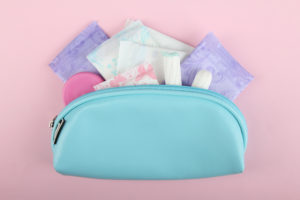 Most women who have handled a box of tampons have come across the words “toxic shock syndrome” (TSS) without spending much time contemplating tampon safety. This rare, but potentially life-threatening, condition is caused by bacterial infections, mainly the Staphylococcus Aureus or the Streptococcus bacteria. TSS is mostly associated with the use of tampons as it is thought that the bacteria thrive in the presence of a super-absorbent tampon. Possible symptoms include high fever, rash on the palms and soles, low blood pressure, vomiting or diarrhea, muscle aches, headaches, disorientation, and redness of the mouth, throat and eyes.
Most women who have handled a box of tampons have come across the words “toxic shock syndrome” (TSS) without spending much time contemplating tampon safety. This rare, but potentially life-threatening, condition is caused by bacterial infections, mainly the Staphylococcus Aureus or the Streptococcus bacteria. TSS is mostly associated with the use of tampons as it is thought that the bacteria thrive in the presence of a super-absorbent tampon. Possible symptoms include high fever, rash on the palms and soles, low blood pressure, vomiting or diarrhea, muscle aches, headaches, disorientation, and redness of the mouth, throat and eyes.
Although TSS can affect anyone, most cases caused by the Staphylococcus bacteria occur in women of menstruating age, followed by cases occurring in older women, children, and men. As far as tampon use is concerned, use of super-absorbent tampons, as well as use of tampons when there is low blood flow, may be increasing the risk of TSS.
To reduce the risks of TSS, focus on these tampon safety tips:
- Change tampons every few hours
- Avoid tampons with applicators, as they increase the danger of scraping the vaginal walls
- Be gentle when inserting and/or removing tampons
- Avoid using tampons overnight or when the flow is light
- Maintain personal hygiene during your period and thoroughly wash your hands before and after handling tampons
- Use tampon immediately after unwrapping and avoid handling more than necessary
- Do not use tampons if you are not on your period
In addition to TSS, tampons can also expire. Some companies may provide an expiry date on the tampon boxes, but that may not always represent the life cycle of the tampons. You may hear that the shelf life of a tampon is about five years, but this comes with certain requirements.
To be safe when using tampons, consider the following:
- Tampons are sanitary, but not sterile
- If there’s no expiration date, write the purchase date on the box
- Always keep tampons in their original packaging and away from excessive moisture, as this reduces the risk of contamination
- The bathroom is NOT the best place to store your tampons: find a cabinet that’s cool and dry
- Don’t let tampons loose in your purse—to avoid ripping the packaging store tampons in a small bag or pouch
- Remember that debris, dust, dirt, and/or mold are not always visible; if the packaging has been ripped or if you have stored tampons in less-than-ideal conditions, it is best to not use them
- Do not use a tampon if there’s noticeable discoloration, mold patches and/or odor
More
 There’s really no such thing as a “normal” period, only because every woman’s period, or menstrual cycle, is unique. But girls and women of all ages have questions, because your cycle will also change over the course of your lifetime. Here are some frequently asked questions from the perspective of different age groups.
There’s really no such thing as a “normal” period, only because every woman’s period, or menstrual cycle, is unique. But girls and women of all ages have questions, because your cycle will also change over the course of your lifetime. Here are some frequently asked questions from the perspective of different age groups.
Teenagers
Almost all teenage girls wonder “When will I get my period?” If they haven’t already, that is! Usually, girls get their periods at around age 11 or 12, but it can happen at any age from 8 to 16. It may happen around the same time that your mom first got hers. If you haven’t gotten your period within three years of when your breasts started to grow, talk to your parent or guardian, your doctor or another adult you trust.
Four other common questions that teenagers ask?
- What exactly is “a period”? Once you’ve hit puberty, your uterus will build up a lining of blood and tissue to prepare for the possibility of being pregnant. That lining would be needed if your egg was fertilized by a sperm cell, as a place for the egg to attach and begin growing into a baby. When the egg doesn’t get fertilized, that blood and tissue comes out.
- What will it look like? Your period flow can be light, heavy, or somewhere in between. It can be light red or dark red and may change from day to day.
- How long will it be? Periods usually last between three and five days, but it’s normal to have periods that are either shorter or longer. It is also normal if your periods are not the same number of days each month, especially in the first years.
- When does it happen? In general, a menstrual cycle takes place over about one month, around 23 to 35 days. But every female’s cycle is different. Try to keep track of when you get it, so you can see if a pattern forms.
Women In Their Thirties and Forties
As you move past your peak fertility years, even if you’ve always had regular periods, you may experience longer, irregular cycles up to 45 days. You may see signs of approaching menopause, like hot flashes and mood changes.
If you’re not approaching menopause, other causes of irregular periods may include stress dramatic weight loss, or sudden weight gain. All of these conditions can affect your body’s hormone levels and may cause changes in the length of your cycle. Medications such as antidepressants can also cause cycle changes. Talk to your doctor if you see any consistent changes in your cycle.
Any more questions? Need a doctor or other professional you can talk to? Call or contact Chouchani, Sayegh and Bagnarello M.D. anytime. You’ll love our caring and knowledgeable doctors and staff.
More
 Most women who have handled a box of tampons have come across the words “toxic shock syndrome” (TSS) without spending much time contemplating tampon safety. This rare, but potentially life-threatening, condition is caused by bacterial infections, mainly the Staphylococcus Aureus or the Streptococcus bacteria. TSS is mostly associated with the use of tampons as it is thought that the bacteria thrive in the presence of a super-absorbent tampon. Possible symptoms include high fever, rash on the palms and soles, low blood pressure, vomiting or diarrhea, muscle aches, headaches, disorientation, and redness of the mouth, throat and eyes.
Most women who have handled a box of tampons have come across the words “toxic shock syndrome” (TSS) without spending much time contemplating tampon safety. This rare, but potentially life-threatening, condition is caused by bacterial infections, mainly the Staphylococcus Aureus or the Streptococcus bacteria. TSS is mostly associated with the use of tampons as it is thought that the bacteria thrive in the presence of a super-absorbent tampon. Possible symptoms include high fever, rash on the palms and soles, low blood pressure, vomiting or diarrhea, muscle aches, headaches, disorientation, and redness of the mouth, throat and eyes.
